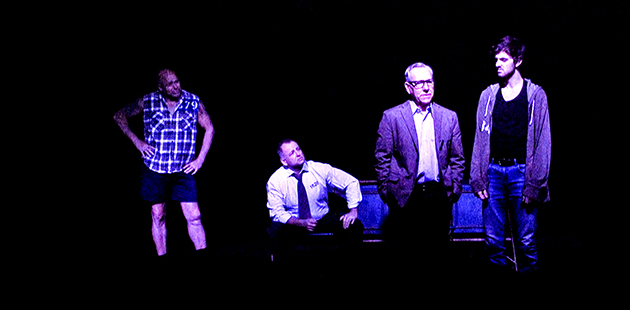 Sometimes we all get the blues, right? Except, for many people, this isn’t temporary, and its effects aren’t minor. For generations of Australian men, discouraged from seeking help by macho culture, ending their life can seem the best option. We consider this from the perspective of afflicted men in a new play, Suicide Row, written and directed by Michael Griffith.
Sometimes we all get the blues, right? Except, for many people, this isn’t temporary, and its effects aren’t minor. For generations of Australian men, discouraged from seeking help by macho culture, ending their life can seem the best option. We consider this from the perspective of afflicted men in a new play, Suicide Row, written and directed by Michael Griffith.
Suicide Row begins in a room furnished only with a bench of four fold-down seats, brightly lit. Three mute men pass the time in their own individual way. A tattooed, middle-aged ocker (Christopher Grant) bangs down a chair seat, to the minor irritation of a straight-laced older professional (Alec Gilbert).
A young man in a hoodie (Charlie Collopy-White) stands behind the others, staring into the distance. Each bears a number on their clothing. With a dimming of lights and a gasp, they are joined by another numbered man, one in a suit and tie (Greg Pandelidis). For the sake of the newcomer, the previous arrivals shared their theories of where they were; might it be heaven, hell, or purgatory.
After self-diversion through talk of safe topics like music, we learned that the men have something in common. Just before arriving here, each attempted suicide. Each had quite different reasons. Each reached the same endpoint, regardless of their occupation, wealth, or whether they had close relationships. In their own time, each comes to suspect that they cannot move on to whatever happens next without talking about their circumstances.
Amongst various other adjectives, Suicide Row describes itself as “inescapably funny”. The intended awkward silences that are supposed to contribute to this don’t actually seem very awkward – we are watching Australian men, after all. At the moment the attempted humour seems a bit too blunt to be effective.
Unfortunately the play reveals its structure a little too readily, robbing it of surprise and making it feel a touch long. A work like Gary Henderson’s An Unseasonable Fall of Snow gets its characters to examine themselves more efficiently as well as maintaining a mystery until the end.
Whilst it is a noble goal to challenge the unofficial cordon of silence around suicide, I have mixed feelings about the approach here. By limiting focus to the men, the audience is spared any self-examination. We don’t have to consider our responsibility to look out for friends and loved ones unable to see beyond their despair. We need to understand that the – quite literally – “toxic masculinity” embodied by these men isn’t a personal defect, it’s a result of social conditioning. We can all play a role in opposing this.
What the piece does well is to capture the precarious nature of isolated Australian males. The characters shared a diversity of trajectories to their final decision. Through this, the play reflects situations – sometimes misdirections away from the sad truth – that many in Australia will recognise.
In thinking about the play, we could recall the function of The Ghost of Christmas Future in Dickens’ A Christmas Carol. There, a vision of times ahead encouraged Scrooge to change his ways. Similarly, Suicide Row shows us the cost of keeping problems to ourselves. It also shows that, given some prodding and the example of others, men can overcome their reluctance to talk more openly. If viewers can draw inspiration from this, the work will certainly reveal its value as an “anti-suicide play”.
Suicide Row
The MC showroom, 1/48 Clifton Street, Prahran
Performance: Friday 3 November 2017 – 7:30pm
Season continues to 12 November 2017
Bookings: www.trybooking.com
Image: the cast of Suicide Row (supplied)
Review: Jason Whyte
